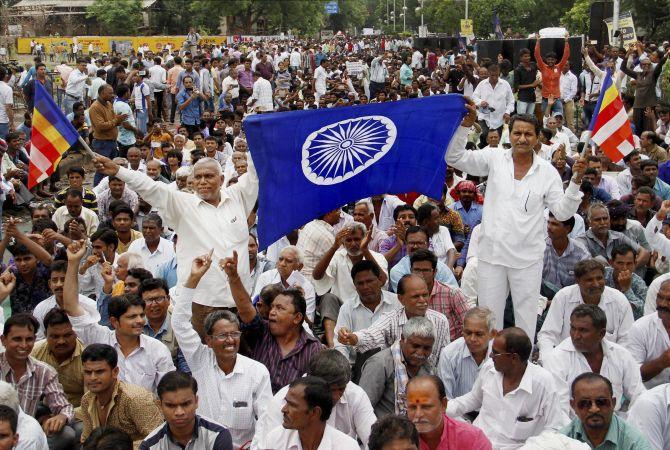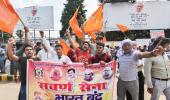The Supreme Court Monday upheld the amendments made to SC and ST (Prevention of Atrocities) Act restoring certain provisions including that anticipatory bail cannot be granted to the accused under this law.

Unless provisions of the Act are enforced in their true letter and spirit, 'the dream and ideal of a casteless society will remain only a dream, a mirage', the top court said. It said that last year while dealing with the review petition of the Centre on the 2018 verdict, the court had recalled most of its directions which had diluted the provisions of arrest under the Act.
The top court's verdict on Monday came on a batch of PILs challenging the validity of the SC/ST Amendment Act of 2018, which was brought to nullify the effect of the apex court's 2018 ruling that diluted the provisions of the stringent Act.
A bench of Justices Arun Mishra, Vineet Saran and S Ravindra Bhat said that most of the general directions like that of preliminary inquiry, grant of bail, prior approval from senior police officials and appointing authority have been recalled in its 2019 verdict on the Centre's review petition.
"The Union of India had filed review petitions, and the same have been allowed, and direction Nos (iii) to (v) have been recalled. Thus, in view of the judgment passed in the review petitions, the matter is rendered of academic importance as we had restored the position as prevailed by various judgments that were in vogue before the matter of Dr Subhash Kashinath (2018 verdict) was decided," the bench said.
The top court said a preliminary inquiry before lodging of case is permissible only in the circumstances as per the law laid down by a 2014 Constitution bench verdict in Lalita Kumari versus Government of Uttar Pradesh.
Dealing with the provision of bail, the bench said, it shall not apply to the cases under SC/ST Act but if the complaint does not make out a prima facie case for offences under the law then the bar created by amended provisions shall not apply.
"The court can, in exceptional cases, exercise power under section 482 CrPC for quashing the cases to prevent misuse of provisions on settled parameters, as already observed while deciding the review petitions," the bench said.
Justice Bhat, who wrote a separate but concurring verdict said, "I consider such stringent terms, otherwise contrary to the philosophy of bail, absolutely essential, because a liberal use of the power to grant pre-arrest bail would defeat the intention of Parliament."
He said that while considering any application seeking pre-arrest bail, the high court has to see that it is used sparingly and such orders made in very exceptional cases where no prima facie offence is made out as shown in the FIR.
"...if such orders are not made in those classes of cases, the result would inevitably be a miscarriage of justice or abuse of process of law," he said.
Justice Bhat said that it is important to keep oneself reminded that while sometimes (perhaps mostly in urban areas) false accusations are made, those are not necessarily reflective of the prevailing and wide spread social prejudices against members of these oppressed classes.
"The marginalisation of scheduled caste and scheduled tribe communities is an enduring exclusion and is based almost solely on caste identities. It is to address problems of a segmented society, that express provisions of the Constitution which give effect to the idea of fraternity referred to in the Preamble, and statutes like the SC/ST Act, have been framed," he said.
Justice Bhat said that to counter the prevailing situation of exclusion based on caste identities, each one of us can foster the feeling of fraternity amongst all sections of the community without reducing the concept to a ritualistic formality.
"It is important to reiterate and emphasize that unless provisions of the Act are enforced in their true letter and spirit, with utmost earnestness and dispatch, the dream and ideal of a casteless society will remain only a dream, a mirage," he said.











 © 2025
© 2025